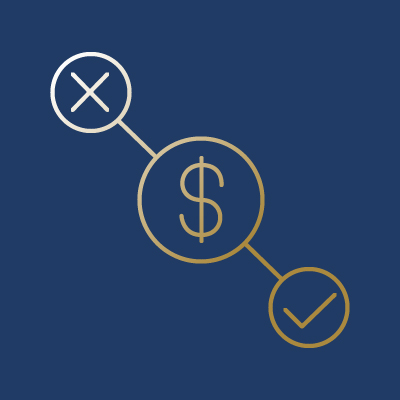
Before acting, ask yourself:
How long until you think you’ll need these investments?
How would you feel if you sold, and then missed out on a rebound of values?
Are there any other minus points to selling now, such as missing out on a dividend from shares?
Are these investments a key part of your overall investment strategy?

Before acting, ask yourself:
Could you give your investments a chance to recover by spending any spare cash or savings to cover expenses?
Could you reduce your monthly spending to not dip into your investments?
Could you go back to work or continue working for a while?

Before acting, ask yourself:
Will you have any other source of income in retirement?
Are your investments diversified, or are they in products considered as long-term investments (and therefore in a better position to recover in the long run?)
Do you have an emergency fund?

Before acting, ask yourself:
Could your child go to a less expensive college in their first year?
Could your child work to pay part of their college fees or get a scholarship?
Do you have some savings that could cover their first year or two, while your investments have a chance to rebound?

Next make a list of all your financial assets (what you own) and any debt you owe.
List them under different categories (known as asset classes)
Cash & deposits –includes current accounts, savings accounts and fixed deposits
Bonds
Stocks
Mutual funds
Others – gold, peer-to-peer loans, cryptocurrencies etc

Check which assets you could use in an emergency, and which have restrictions on accessing their value (such as a retirement fund, a business or a property).
Also add up your assets compared to any debt you have – credit card debt, car loans, personal loans, mortgages etc.
Look at what products you are invested in (your asset allocation) and research which allocations are suggested for your circumstances (age, dependents etc) or risk tolerance.
Conservative portfolios have more money in cash and bonds and so have less risk of loss. They generally give a lower return, so take longer to grow.
Aggressive portfolios are invested more in stocks, especially small-cap stocks or emerging foreign markets. There is a chance you can lose money, but they also have the potential to grow faster.
Normally, the earlier you will need your money, the more conservatively you should invest. And the longer you can wait for your money, the more aggressively you can invest.
Also check you don’t have more than 5-10% of your assets any one company (including your employer) or concentrated in any single industry.

For certain types of investments, there are fees or penalties for buying or selling, taking money out or closing accounts. These can include for stocks and bonds, mutual funds, annuities and pension plans. Add the fees into your consideration.

When you have considered all of the above, you might decide to adjust your investments to match an asset allocation that suits your circumstances, or sell some investments so that you have an emergency fund of cash to cover 6 months’ expenses. Of course after careful consideration, you might think it best to stay with your current investments and wait for the market to recover.
For guidance on crafting your personal investment strategy reach out to one of our Wealth Specialists.
This article is brought to you by Standard Chartered Bank UAE. All information provided is for informational purposes only.
Disclaimer:
This article is for general information only and it does not constitute an offer, recommendation or solicitation to enter into any transaction. This article has not been prepared for any particular person or class of persons and it has been prepared without regard to the specific investment or insurance objectives, financial situation or particular needs of any person. You should seek advice from a licensed or an exempt financial adviser on the suitability of a product for you, taking into account these factors before making a commitment to purchase any product. In the event that you choose not to seek advice from a licensed or an exempt financial adviser, you should carefully consider whether the product is suitable for you. You are fully responsible for your investment decision, including whether the investment is suitable for you. The products/services involved are not principal-protected and you may lose all or part of your original investment amount.








